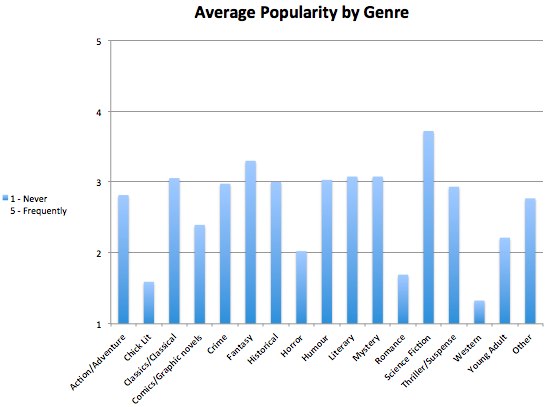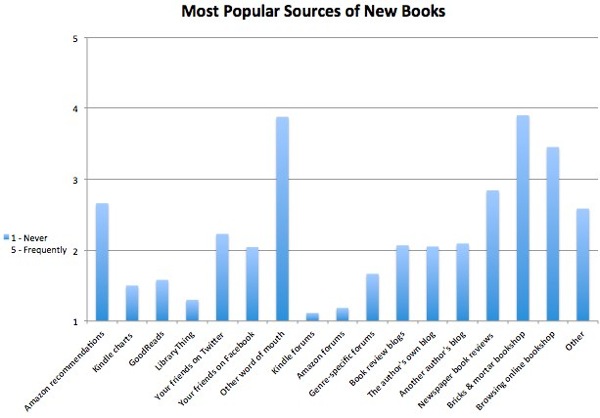Last month I put together a brief survey to find out how people find new books and authors. One of the biggest challenges facing new authors, regardless of whether they are self-published or going with a traditional publisher, is getting the word out about their work. Increasingly, authors are having to do a significant amount of legwork in terms of promotion as marketing and advertising budgets are slashed, whether we like it or not.
The trouble is, most self-published authors don’t have a particularly detailed understanding of their market. Either they haven’t thought to find out, or simply don’t know where to start. It’s understandable – we didn’t get into writing in order to become expert marketeers – but something that we just have to get to grips with.
So I thought I’d start my own journey towards understanding by asking people where they find out about new books and authors. Here are the results. Note: In the original question, 1 meant “frequently” and 5 meant “never”, but I inverted it during analysis so that the graphs made more sense.
Question 1: What genres of fiction do you enjoy reading?
The first question asked people to rate how often they read particular genres. As you can see, respondents were fairly evenly spread, but the most popular genres were Science Fiction and Fantasy; the least popular were Western, Chick Lit, Romance, and Horror.

Question 2: Where do you find about about new books and new authors?
The second question asked people to rate how frequently they found new books or authors via different methods. There’s bad news for self-publishers here: The most popular ways to find new authors remains word of mouth (but not via Twitter or Facebook), browsing in a bricks and mortar bookshop, browsing in an online bookshop and newspaper reviews.
Least popular sources were Kindle forums and Amazon forums, which isn’t a surprise as much of the content there is for authors trying to figure out the vagaries of Amazons physical and ebook stores. Disappointingly, GoodReads and Library thing fared poorly too.

Now, my sample size was quite small, just 238 responses. But it echoes Verso Digital’s 2011 Survey of Book-Buying Behaviour, released last month, which polled 2,200 respondents. Verso Digital found that most of their respondents found new books through personal recommendation (49.2%), bookstore staff recommendations (30.8%), advertising (24.4%, and a source I forgot to add in), search engines (21.6% and ditto). Only 11.8% found new books through social networks and 12.1% via blogs. Book reviews accounted for 18.9%.
There are a lot more interesting nuggets in the report, so it’s well worth a flick through the slides.
Conclusions: Personal recommendation most important for self-publishers
The results of this survey are a bit of a mixed bag for self-publishers. For most of us it’s impossible to get our books into prominent positions in bookshops either offline or on, and even harder to get newspaper reviews. The places where it’s easy for us to gain access, such as GoodReads, LibraryThing, Twitter, Facebook and on our own blog simply aren’t that influential. It’s disappointing, because these are places where authors can be very proactive.
My suspicion is that whilst the people who use book-focused sites are avid readers and buyers, there are few of them in the broader population. Given the lack of referral stats for Amazon there’s no way of knowing how many people find my book from Goodreads, but I know that few make it over to my blog from there.
So what are we left with? Both my graph and the Verso Digital figures show that self-published authors should focus on encouraging people to make personal recommendations for their work, as that is still the most important way that people find new authors and books. Simply telling your friends that you recently read a book and loved it appears to be the single most important thing you can do to help an author along. Plus ça change, eh?





Comments on this entry are closed.